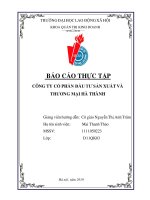DENGUE HEMORRHAGIC FEVER PRESENTER Mr NANDU C NAIR
Bạn đang xem bản rút gọn của tài liệu. Xem và tải ngay bản đầy đủ của tài liệu tại đây (1.41 MB, 27 trang )
DENGUE
HEMORRHAGIC
FEVER
PRESENTER:
Mr. NANDU C
NAIR
DEAR
FRIENDS…..
STAY AWAY
FROM…
..DENG
U
E
CONTENT:•INTRODUCTION
•DEFINITION
•CLASSIFICATION
•DENGUE HEMORR. FEVER
•INCIDENCE,CAUSES
•RISK FACTORS
•SIGNS AND SYMPTOMS
•TREATMENT
•NURSING ASSESSMENT
•NURSING DIAGNOSIS
•PROGNOSIS
•COMPLICATION
•PREVENTION
•WHAT TO DO/NOT TO DO
II ALL ARE SAME:N
N
TT
R
R HEMORRHAGIC
O
O FEVER
D
D DENGUE HEMORRHAGIC
U
U FEVER
C
C PHILIPPINE HEMORRHAGIC
TT FEVER
THAI HEMORRHAGIC
II
FEVER
O
O SINGAPORE HEMORRHAGIC
N
N FEVER
WHAT IS DENGUE
FEVER ?
•Dengue fever also known as
breakbone fever, is an infectious
tropical
disease caused by dengue
DENGUE VIRUS INFECTION
WITH
WITHOUT
DSS
Symptomatic
DHS
UVS
DFS
HEMORHAGE
HEMORHAGE
SHOCK
D Asymptomatic
DENGUE HEMORRHAGIC
FEVER??
Severe, potentially deadly
infection spread by certain
species of mosquitoes [AEDES
AEGYPTI]
INCIDENCE
Worldwide, more than 100
million
cases of dengue fever occur
every
year.
A small number of these
develop
CAUSES
Dengue hemorrhagic fever
occurs
when a person catches a
different
type dengue virus after
being
infected by another one
sometime
RISK FACTORS
Persons having
antibodies to dengue virus
from prior infection,
Females,
Age below 12 years,
SYMPTOMS OF D.HEMORRHAGIC
FEVER
¢ Similar to symptoms of
dengue
EARLY fever
ACUTE
PHASE
SYMPTOMS
1
2
SYMPTOMS OF D.HEMORRHAGIC
FEVER
1
.
•Decreased
Appetite
•
Fever
EARLY
•Headache
SYMPTOMS
•Joint aches
•Malaise
•Muscle aches
•Vomiting
SYMPTOMS OF D.HEMORRHAGIC
FEVER
2
.
a.Restlessness
followed by
ACUTE
*Ecchymosis
PHASE
*Generalized rash
*Petechiae
*Worsening of
SYMPTOMS OF D.HEMORRHAGIC
FEVER
ACUTE
PHASE
2
.
b. Shock-like state
*Cold, Clammy
extremities
*Sweatiness
(Diaphoretic)
DIAGNOSTIC EVALUATION
PHYSICAL EXAMINATION
BLOOD TESTS
RADIOLOGICAL
INVESTIGATION
DIAGNOSTIC EVALUATION
BLOOD TESTS
Arterial blood gases (ABG)
Coagulation studies
Serum electrolytes
Hematocrit
Liver enzyme tests
Platelet count
Dengue antibody
(IgG,IgM,NS1)
TREATMENT: NO KNOWN CURE OR VACCINE…TREAT THE
SYMPTOMS
MEDICATION AS PER THE CONDITION OF
THE PATIENT
INTRA VENOUS FLUID
FRESH FROZEN PLASMA/ PLATELETS
OXYGEN THERAPY
SUPPORTIVE CARE
NURSING ASSESSMENT:-
1.Identity
2.Main complaint
3.History of present
illness
4.History of previous
illness
5.Family history of
disease
NURSING DIAGNOSIS:-
1.Hyperthermia
2.Fluid deficit
3.Fluid volume deficit
4.Impaired nutritional
needs
5.Hemorrhage
6.Anxiety
P
R
O
G
N
O
S
I
S
With early and
aggressive care, most
patients recover from
dengue hemorrhagic
fever.
However half of
untreated patients
who go into shock do
COMPLICATIO
NS:-
COMPLICATIO
NS:Encephalopathy
❷Liver Damage
❸Residual Brain
Damage
❹Seizures
❺Shock
❶
“PREVENTION IS
BETTER THAN
CURE”
PREVENTION:Use personal protection such as
netting,full coverage
clothes,mosquito repellent etc.
Travel during periods of minimal
mosquito activity
Promote mosquito
abatement programs
DO AND DONT’S:WHAT TO DO?
Keep body temperature
below 39 degree Celsius
Give large amount of
fluids
Complete rest
Immediately consult the
doctor if any symptoms
occur
WHAT NOT TO DO?









